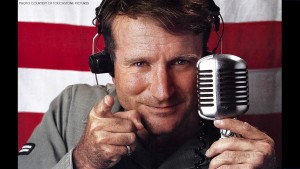Last week, Mr. Hunt’s Lessons of Vietnam and Recent International Relations class screened Levinson’s “Good Morning Vietnam.”
If you haven’t seen it here’s a quick summary: Adrian Cronauer, played by Robin Williams, is a witty, fast-talking disc-jockey (DJ if you didn’t know) during the Vietnam War. His show, that broadcasts “From the Delta to the DMZ,” is racy and he finds himself getting into trouble with two superiors that don’t quite seem to get it.
He falls in love with a young Vietnamese girl in his English class and befriends a boy who turns out to be a member of the Viet Cong, his supposed enemy.
“Good Morning Vietnam” came out 27 years ago, and even then, it was 13 years after the fall of Saigon and end of the Vietnam War. So the question is, why is it relevant, why should I, as a young high school student, watch “Good Morning Vietnam” when it is about something that happened over 40 years ago?”
“Good Morning Vietnam” is a must watch even today, especially today for one simple reason — the brilliance of the late Robin Williams’ acting.
I hold that “Good Morning Vietnam” is Williams’ best film. Williams, as a comedian, always kept a certain wall between himself and the audience. Comedians such as George Carlin gave us some idea of what was beyond that wall, or at least supposedly beyond, through confessional autobiography in his comedy.
Williams, however, uses comedy as camouflage and personal concealment, a true chameleon. In many of his other roles, “The World According to Garp,” “Moscow to Hudson” and so on, Williams is given a well-written character and held to it by an unwavering director, or else he will slip back into his stand-up act, concealing not only himself, but the character as well.
What Levinson did, however, with “Good Morning Vietnam,” is set an ingenious trap. The character of Adrian Cronauer is a stand-up comic, and William’s tactics are turned against him. There is no biographical information on Cronauer. The audience is blissfully unaware of where he came from, how he grew up, if he has family at home, his dreams, fears, and regrets. This is to the movie’s benefit.
Everything in Cronauer world consists of material for the program. Levinson uses a base script for Williams’ monologues, but then allows him to improvise and the best parts were cut into the film. By doing this, the many faces of Williams breathes life into a character and the end result is undeniably hilarious.
While Cronauer is rocking the microphone, however, Levinson is hard at work developing characters who are complicated and human. These characters, such as Tuan, the boy who is a member of the Viet Cong, along with the events of the script trap Williams into situations where he must express humanity and emotion, or die.
It’s easy to breeze over the film and chock it up to a Vietnam-era “MASH.”
“Good Morning Vietnam” really isn’t about war at all, as it is about comedy and a person’s compulsion to stand up and make us laugh – control us.
Comics do that because they need their power validated and they need that because comics are some of the most troubled and insecure people on Earth. The one sure fire way to treat low self-esteem is to do esteemable actions, so that you can finally say “I did that!”
That’s exactly what Williams’ character does in “Good Morning Vietnam.” At the end of the film Cronauer hardly wisecracks at all, because he doesn’t need to anymore. He no longer thinks he’s the same worthless Air Force soldier that got off the plane.
They say if you want to know what a film is really about, don’t pay attention to the plot, pay attention to what changes. Cronauer character and comedy was originally funny, yet detached, cynical and his eyes had an opaque glaze. By the end he is not making those jokes anymore, and you can see right through his eyes to what he’s thinking; that’s the purpose of “Good Morning Vietnam.”

Leave a Reply